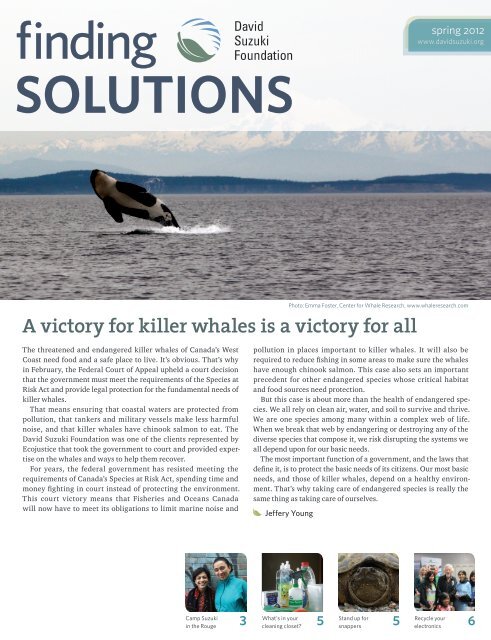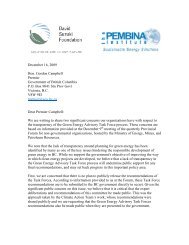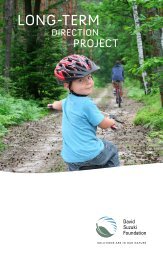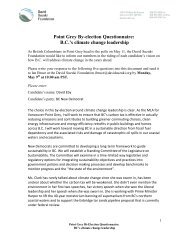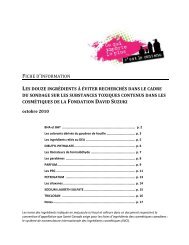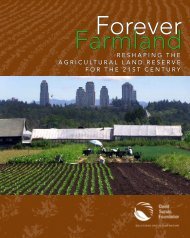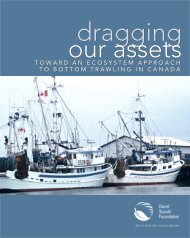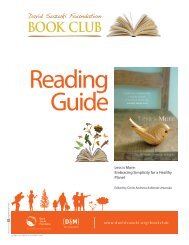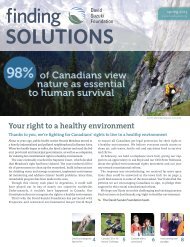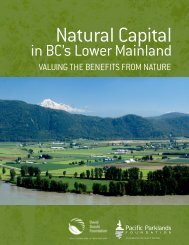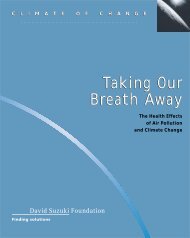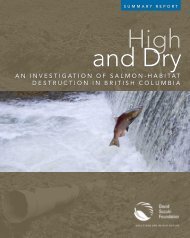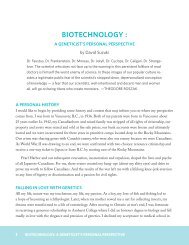Finding Solutions — Spring 2012 (PDF) - David Suzuki Foundation
Finding Solutions — Spring 2012 (PDF) - David Suzuki Foundation
Finding Solutions — Spring 2012 (PDF) - David Suzuki Foundation
You also want an ePaper? Increase the reach of your titles
YUMPU automatically turns print PDFs into web optimized ePapers that Google loves.
finding<br />
SOLUTIONS<br />
spring <strong>2012</strong><br />
www.davidsuzuki.org<br />
Photo: Emma Foster, Center for Whale Research, www.whaleresearch.com<br />
A victory for killer whales is a victory for all<br />
The threatened and endangered killer whales of Canada’s West<br />
Coast need food and a safe place to live. It’s obvious. That’s why<br />
in February, the Federal Court of Appeal upheld a court decision<br />
that the government must meet the requirements of the Species at<br />
Risk Act and provide legal protection for the fundamental needs of<br />
killer whales.<br />
That means ensuring that coastal waters are protected from<br />
pollution, that tankers and military vessels make less harmful<br />
noise, and that killer whales have chinook salmon to eat. The<br />
<strong>David</strong> <strong>Suzuki</strong> <strong>Foundation</strong> was one of the clients represented by<br />
Ecojustice that took the government to court and provided expertise<br />
on the whales and ways to help them recover.<br />
For years, the federal government has resisted meeting the<br />
requirements of Canada’s Species at Risk Act, spending time and<br />
money fighting in court instead of protecting the environment.<br />
This court victory means that Fisheries and Oceans Canada<br />
will now have to meet its obligations to limit marine noise and<br />
pollution in places important to killer whales. It will also be<br />
required to reduce fishing in some areas to make sure the whales<br />
have enough chinook salmon. This case also sets an important<br />
precedent for other endangered species whose critical habitat<br />
and food sources need protection.<br />
But this case is about more than the health of endangered species.<br />
We all rely on clean air, water, and soil to survive and thrive.<br />
We are one species among many within a complex web of life.<br />
When we break that web by endangering or destroying any of the<br />
diverse species that compose it, we risk disrupting the systems we<br />
all depend upon for our basic needs.<br />
The most important function of a government, and the laws that<br />
define it, is to protect the basic needs of its citizens. Our most basic<br />
needs, and those of killer whales, depend on a healthy environment.<br />
That’s why taking care of endangered species is really the<br />
same thing as taking care of ourselves.<br />
Jeffery Young<br />
Camp <strong>Suzuki</strong><br />
in the Rouge<br />
What’s in your<br />
Stand up for<br />
Recycle your<br />
3 5 5 6<br />
cleaning closet?<br />
snappers<br />
electronics
donor profile<br />
Online donor finds inspiration<br />
in natural world<br />
Online donor Pamela Wright<br />
I want to be part of the<br />
solution, and it’s never too<br />
late to learn and change<br />
one’s ways. My journey<br />
is just beginning.<br />
Pamela Wright is an online donor from<br />
Whitchurch-Stoufville, Ontario. She and<br />
her husband Andy live in the environmentally<br />
sensitive Oak Ridges Moraine,<br />
where they raised their four children.<br />
Now retired from her picture-framing<br />
business, she concentrates on her own art,<br />
using pastels, watercolours, and oils to<br />
capture the disappearing farmlands that<br />
surround her. She also enjoys hiking in<br />
the local forests, camping, and educating<br />
herself about the environment.<br />
What made you decide to donate<br />
to the <strong>Foundation</strong> online?<br />
I had been donating to two worthwhile<br />
groups: Doctors Without Borders and<br />
Greenpeace. Having read online about the<br />
good work the <strong>Foundation</strong> is doing in Canada,<br />
it was a simple choice to begin donating<br />
to it as well. As a proud Canadian, I<br />
feel that when we concentrate on what is<br />
happening in Canada and try to change<br />
things for the better here, our actions will<br />
be recognized and impact other countries<br />
worldwide. You could say the first step to<br />
change starts at home.<br />
What, in your opinion, is<br />
the greatest environmental<br />
concern facing Canadians?<br />
The greatest environmental concern facing<br />
Canadians today, in my opinion, is our<br />
political leaders’ lack of understanding<br />
and will to change our way of life. Canada<br />
has such an opportunity to step up and<br />
lead the world on so many fronts, not the<br />
least of which is the environment.<br />
Tell us a bit about your journey to<br />
learn more about the environment.<br />
For years I have been recycling and<br />
reusing, but now I want to do more. So<br />
I use the Internet, books at the library,<br />
newspaper and magazine articles, and<br />
science programs (including those of the<br />
<strong>David</strong> <strong>Suzuki</strong> <strong>Foundation</strong>) to learn how<br />
to live green and become more environmentally<br />
active. Recently, I signed up for<br />
the Queen of Green’s e-newsletter, which<br />
I find very informative. Doing this gives<br />
me peace of mind; I want to be part of<br />
the solution, and it’s never too late to<br />
learn and change one’s ways. My journey<br />
is just beginning.<br />
What is your favourite way<br />
to connect with nature?<br />
There are so many: watching the first<br />
green leaves appear in spring, hearing<br />
the return of the birds, seeing the<br />
white fluffy clouds scudding across the<br />
sky, taking the first walk in the woods<br />
in spring, listening to the night sounds<br />
while I lie awake in the tent, feeling the<br />
beauty that nature gives back to you,<br />
and sharing all this and more with my<br />
husband and family.<br />
Leave a legacy for the children of tomorrow<br />
Build the <strong>David</strong> <strong>Suzuki</strong> <strong>Foundation</strong> into your estate planning. Consider a gift in<br />
your will, or another type of legacy gift, to help ensure a healthy environment for<br />
generations to come. Or, if you’ve already done so, let us know so we can thank you!<br />
Please contact Deborah Eaton-Kent at<br />
604.732.4228 • 1.800.453.1533 • deatonkent@davidsuzuki.org<br />
2
Meet our Camp<br />
<strong>Suzuki</strong> teams<br />
Jode Roberts<br />
Our Camp <strong>Suzuki</strong> in the Rouge program celebrates the Rouge River<br />
watershed<strong>—</strong>a wilderness gem in the heart of the Greater Toronto<br />
Area where we are working to establish Canada’s first urban<br />
national park. To get local communities engaged in the creation<br />
of the park, we are inspiring them to create projects that connect<br />
residents with this natural treasure.<br />
The <strong>Foundation</strong> has recruited and trained 11 incredible teams to<br />
design and launch unique Rouge-related activities. Here are just<br />
five of the teams and their plans.<br />
CultureLink<br />
CultureLink Settlement<br />
Services is a non-profit<br />
agency that facilitates<br />
the independence and<br />
full participation of<br />
newcomers in Toronto’s<br />
diverse community. The<br />
team will be hosting<br />
a spring tree-planting<br />
event, nature walk, and a campout at Glen Rouge Campground.<br />
The tree-planting will bring together 17 new Canadian youth from<br />
11 different countries with 17 aboriginal youth and 17 seniors to<br />
share stories about their cultures, history, and future.<br />
Rouge Valley<br />
Naturalists<br />
Rouge Valley Naturalists<br />
is a not-for-profit<br />
organization dedicated<br />
to protecting, preserving,<br />
and restoring the<br />
natural heritage of the<br />
Rouge Valley. Team RVN<br />
is keen to work on two<br />
projects: an in-class butterfly-rearing program and an outdoor<br />
education program customized for people with disabilities.<br />
Rouge<br />
Park<br />
Hikers<br />
The Hikers<br />
lead two-hour<br />
nature walks<br />
for thousands<br />
of residents<br />
in the area<br />
each year.<br />
They will reach out to local residents, especially<br />
new Canadians, inviting them out for monthly hikes<br />
and a special Portrait in the Park day where families<br />
can have their photos taken with the Rouge as a<br />
backdrop. The Hikers intend to help these families<br />
learn about local flora and fauna and develop an<br />
appreciation for how nature can enrich their lives.<br />
Dunbarton<br />
High School<br />
The Dunbarton High<br />
School team includes<br />
students from the<br />
school’s environmental<br />
club. Their goal is to<br />
celebrate Rouge Park’s<br />
forests, beaches, and<br />
wetlands by holding a<br />
hiking event in the spring and a fun yoga event in the summer.<br />
They hope to reach students within their school and at local<br />
elementary schools, and they will be partnering with nearby<br />
yoga studios to get youth stretching in the park.<br />
Theatre and<br />
Performance Studies<br />
University of Toronto-<br />
Scarborough Campus<br />
With a group of eight<br />
undergraduate students in the<br />
Theatre and Performance Studies<br />
program at UTSC, the team will<br />
develop an original piece of theatre<br />
about Rouge Park. More than a<br />
“straight-up” educational primer on environmentalism, it will connect the<br />
audience with the park in a creative and inventive way.<br />
All photos by Sherry Prenevost<br />
3
iefs<br />
Connecting with Nature<br />
A new environmental educational<br />
guide for children in grades four to six<br />
is now available on our website. It’s<br />
full of fun, hands-on activities to help<br />
children explore their profound connection<br />
to nature, and it encourages<br />
students to get outside to let their<br />
curiosity about nature run wild. Go to<br />
www.davidsuzuki.org/youthandnature<br />
to download your free copy.<br />
Reducing the impacts<br />
of bottom trawling<br />
The <strong>Foundation</strong>, along with the Living Oceans Society, has<br />
collaborated with the B.C. groundfish bottom trawl industry<br />
to create a suite of measures that reduce the impacts of this<br />
fishery on seafloor habitats, particularly the fragile coral and<br />
sponges that support ocean life. These new management<br />
measures include defined boundaries for the fishery, individual<br />
limits on coral and sponge bycatch, and a reporting and<br />
review protocol.<br />
Trip shows nature’s resilience<br />
Conservation works. On a<br />
recent visit to the Galápagos<br />
Islands, <strong>David</strong> <strong>Suzuki</strong><br />
and Tara Cullis<strong>—</strong>along<br />
with a team of <strong>Foundation</strong><br />
supporters<strong>—</strong>witnessed<br />
the recovery of the iconic<br />
giant tortoise and an<br />
Photo: L. Stuart<br />
ocean teeming with life.<br />
G Adventures had donated 14 trips, which our donors purchased.<br />
Proceeds went to the <strong>Foundation</strong>, and a fascinating<br />
time was had by all.<br />
Celebrating the season at<br />
the Winter Summit<br />
The <strong>2012</strong> Winter Summit was a huge success. Presented<br />
by Desjardins Group and held in Quebec City from January<br />
27 to 29, it celebrated winter while teaching people about<br />
climate change. Five hundred people attended a conference<br />
with astronaut Julie Payette and explorer Bernard Voyer. Our<br />
rollicking Gala had even Bonhomme Carnaval dancing. And<br />
hockey games with NHL alumni were the perfect way to cap a<br />
fun-filled weekend.<br />
The <strong>Suzuki</strong> Elders speak their minds on issues like the<br />
Alberta tar sands.<br />
Introducing the<br />
<strong>Suzuki</strong> Elders<br />
Get to know the newest contributors<br />
to <strong>Finding</strong> <strong>Solutions</strong><br />
Who are we?<br />
We’ve got values, vision, a purpose statement, and a strategic<br />
plan. We do environmental education for other elders,<br />
write a blog on our website, go to rallies and marches, send<br />
letters to the editor and government representatives, and post<br />
on Facebook. We go to lectures, attend seminars, and invite<br />
speakers to our meetings. We debate and analyze environmental<br />
issues. We encourage other elders to act and invite them to<br />
join us. We walk and talk environment from an elder perspective<br />
with friends, colleagues, family, and community.<br />
We are <strong>Suzuki</strong> Elders.<br />
Working with and through the <strong>David</strong> <strong>Suzuki</strong> <strong>Foundation</strong>, we<br />
are a 58-member group of self-identified elders, governed by a<br />
14-member Council of Elders. We use our voices, experiences,<br />
and memories to mentor, motivate, and support other elders<br />
and younger generations in dialogue and action on environmental<br />
issues. Over the past two years we’ve held two major<br />
Elder and Environment Forums, hosted many smaller gatherings,<br />
prepared an Eldercollege lecture series for Capilano<br />
University in North Vancouver, and presented at an international<br />
conference on Growing Old in a Changing Climate.<br />
At our Annual General Meeting in March, we started<br />
developing a <strong>Suzuki</strong> Elder perspective to guide us as we<br />
facilitate elder dialogue about environmental sustainability<br />
and respond to the challenges, responsibilities, and opportunities<br />
facing us all. When it comes to children, grandchildren,<br />
and other youngsters in our lives, we wear our<br />
environmental hearts on our sleeves.<br />
Oh, and we also have fun!<br />
Want to get in on the action? We welcome your interest,<br />
experience, energy, and support. Check out our website,<br />
http://sites.google.com/site/elders.dsf/, for news, useful links,<br />
background information, and a membership application. Or<br />
contact us at elders@davidsuzuki.org.<br />
Diana Ellis<br />
4
Standing up<br />
for snappers<br />
Photo: Jeremiah John McBride<br />
After surviving 40 million years on Earth, Canada’s largest terrestrial<br />
reptile is in serious danger. Every day, this lumbering<br />
creature contends with toxic chemicals in its wetland habitat and<br />
cars whizzing by on the highway, not to mention hunters with a<br />
penchant for turtle soup.<br />
That’s right. Even though snappers are listed under Canada’s federal<br />
endangered species law, anyone in Ontario with a valid fishing<br />
or hunting licence can catch up to two per day.<br />
That’s why the <strong>David</strong> <strong>Suzuki</strong> <strong>Foundation</strong> has raised its voice<br />
on behalf of snapping turtles, demanding an end to the hunt in<br />
Ontario. A recent report entitled The Road to Extinction: a call to<br />
end the snapping turtle hunt, which we produced in partnership<br />
with Ontario Nature and the Kawartha Turtle Trauma Centre,<br />
attracted widespread media attention across the country. Thousands<br />
of Canadians responded by sending letters to the Ontario<br />
government, insisting it protect the turtles from hunting.<br />
Snappers already face enormous natural challenges; although<br />
they can live up to 100 years, it takes them 15 to 20 to reach full<br />
maturity. As a result, adult mortality greatly affects the survival of<br />
the entire species.<br />
You can help ensure their survival by sending a letter to the<br />
Ontario government. Visit http://action.davidsuzuki.org/snappers.<br />
Jode Roberts<br />
Are there skeletons in your cleaning closet?<br />
Stop right there. Put that microwave<br />
cleaner down before someone gets<br />
hurt.<br />
Now, take a lemon and cut it in<br />
half. Put it in a bowl of water and<br />
microwave it for 30 seconds. Then<br />
rub the inside of the microwave with<br />
the lemon and wipe the gunk away.<br />
It only takes two minutes, and<br />
it works just as well as any storebought<br />
product. Plus, it won’t trigger<br />
allergies or cause cancer.<br />
That’s right<strong>—</strong>cancer.<br />
Photo: go_greener_oz<br />
Many household cleaners contain<br />
hazardous chemicals<strong>—</strong>you’ve<br />
probably seen the skull and crossbones sign on some containers.<br />
To make matters worse, in Canada, manufacturers are not<br />
required to disclose all the ingredients in their products, not even<br />
chemicals associated with chronic health problems like cancer,<br />
allergies, asthma, and reproductive issues.<br />
That’s why we want to find out about the nasty toxics lurking<br />
in your cleaning cupboard. We’re asking our supporters to<br />
take the What’s Inside? That Counts Cleaning Survey, and tell us<br />
what they’re using to scrub down their homes. This information<br />
will help us advocate for more transparent labelling on cleaning<br />
products. You can complete the survey at www.davidsuzuki.org/<br />
cleaners-survey until May 31.<br />
Fortunately, you don’t need those unnecessary toxins to have<br />
a clean and healthy home. According to Lindsay Coulter, <strong>David</strong><br />
<strong>Suzuki</strong>’s Queen of Green, “There are simpler, cheaper ways to<br />
clean that will leave your home sparkling.”<br />
When you visit us online to take the survey, check the Queen of<br />
Green’s safe and healthy cleaning product recipes. And while you’re<br />
there, sign up for the <strong>Spring</strong> Breakup challenge. You’ll receive cleaning<br />
tips and tricks and a chance to win fabulous prizes.<br />
Mel Lefebvre<br />
5
eal life<br />
Each Canadian province has a HHW collection program to<br />
help you dispose of these chemicals with minimal environmental<br />
impact. Search your city website for drop-off depots and collection<br />
dates.<br />
Before heading to the depot<br />
• Keep materials in their original containers or ensure that<br />
containers are well-labelled<br />
How to dispose of household<br />
hazardous waste<br />
Household hazardous waste (HHW) can cause illness or death to<br />
people, plants, and animals. It can contaminate our bodies, homes,<br />
and the environment.<br />
HHW includes hair colouring, car wax, nail polish remover,<br />
rechargeable batteries, and shoe polish. Most household cleaners<br />
are also HHW, including abrasive and all-purpose cleaners,<br />
aerosol air fresheners, bleach, disinfectants, drain cleaners, fabric<br />
softeners, and glass and toilet cleaners.<br />
If you have these chemicals in your home, you’ll want to dispose<br />
of them correctly. This will ensure waste workers are not at risk of<br />
inhaling toxic substances and reduce the chance of fires or explosions.<br />
Never pour or flush HHW down the drain. Not only will this<br />
contaminate our waterways and oceans, it can corrode plumbing<br />
and cause septic system failure.<br />
• Do not mix different products together<br />
• Tightly cap all containers<br />
You can identify HHW by these hazard symbols<br />
Toxic: can cause illness<br />
Corrosive: can eat through materials or living tissue<br />
Flammable: can catch fire or burn easily<br />
Reactive/explosive: can cause rapid heating<br />
or explosions<br />
Lindsay Coulter<br />
<strong>David</strong> <strong>Suzuki</strong>’s Queen of Green<br />
funding solutions<br />
Turn e-waste into donation dollars<br />
Clean out your desk drawers and closets! Keep old, obsolete,<br />
or unwanted electronics out of landfills and fundraise for the<br />
<strong>Foundation</strong> by sending them to Think Recycle.<br />
It’s easy. Collect at least 10 acceptable electronics (e.g., cellphones,<br />
print cartridges, digital cameras, laptops, and iPods). Then register<br />
at www.thinkrecycle.com (say you’re raising funds for the <strong>David</strong><br />
<strong>Suzuki</strong> <strong>Foundation</strong>) and follow their directions for getting your<br />
discards to their plant.<br />
Reusable electronics will be refurbished. Those that can’t be<br />
brought back to life will be carefully dismantled and separated,<br />
and metals, glass, and plastic turned into raw materials for future<br />
production of new goods.<br />
Organize an e-waste drive at your office or school. Think Recycle<br />
even plants a tree for every 24 qualifying products donated!<br />
Gail Mainster<br />
Kimberly Hoover of Think Recycle with <strong>David</strong> <strong>Suzuki</strong><br />
Secondary School students Jasmine Kaur, Zoya Chahal,<br />
Mannal Maqbol, Nikki Sandhu, and Nikeshia Hamilton.<br />
6
finding SOLUTIONS<br />
A publication of the <strong>David</strong> <strong>Suzuki</strong><br />
<strong>Foundation</strong>, a registered Canadian<br />
charity working to protect the diversity<br />
of nature and our quality of life, now<br />
and for the future.<br />
2211 West 4th Ave., Suite 219<br />
Vancouver, B.C., Canada, V6K 4S2<br />
toll free 1-800-453-1533<br />
davidsuzuki.org<br />
Editor Rachelle Delaney<br />
Contributors<br />
Leanne Clare, Lindsay Coulter, Manon<br />
Dubois Croteau, Jodi Garwood, Ian<br />
Hanington, Mel Lefebvre, Gail Mainster,<br />
Jode Roberts, <strong>David</strong> <strong>Suzuki</strong>, Jeffery Young<br />
Design and Production Sarah Krzyzek<br />
Board of Directors<br />
Stephen Bronfman, Dr. Tara Cullis<br />
(President and Co-Founder), Sarika<br />
Cullis-<strong>Suzuki</strong>, Severn Cullis-<strong>Suzuki</strong>,<br />
Pauline D’Amboise (Secretary), James<br />
Hoggan (Chair), <strong>David</strong> Miller, Stephanie<br />
Green, Dr. Samantha Nutt, Miles<br />
Richardson, George Stroumboulopoulos,<br />
Dr. Peter Victor, Elaine Wong (Treasurer)<br />
Co-Founder<br />
Dr. <strong>David</strong> <strong>Suzuki</strong><br />
Chief Executive Officer<br />
Peter Robinson<br />
Development Director<br />
Andrea Seale<br />
Public Affairs and Communications<br />
Director<br />
James Boothroyd<br />
Director of Finance and Technology<br />
Vic Johnston<br />
Program Directors<br />
Morag Carter, Karel Mayrand,<br />
Dr. Faisal Moola, Jay Ritchlin<br />
Human Resources Director<br />
Catherine Gordon<br />
Charitable number<br />
Canada: BN 127756716RR0001<br />
US: 94-3204049<br />
Printed on 100% postconsumer<br />
recycled paper,<br />
processed chlorine free.<br />
Yukon: a wilder place<br />
Photos by Fritz Mueller and text by Teresa Earle,<br />
Greystone Books<br />
recommended<br />
Images of the Yukon can make even the most stubborn<br />
urbanite long for wild spaces and solitude, and those in<br />
Mueller and Earle’s gorgeous new coffeetable book are no<br />
exception. An exploration of the iconic territory “where<br />
personal space is measured across entire valleys,” its striking<br />
images and evocative text lets us lose ourselves in vast<br />
herds of caribou, icy rivers, and the aurora borealis.<br />
On the Line<br />
Written and directed by Frank Wolf<br />
Breathtaking footage reveals the ancient forests, fish-filled rivers,<br />
and pristine coast at risk if the Enbridge Northern Gateway<br />
mega-project goes ahead. Filmmaker Frank Wolf and friend<br />
Todd McGowan bike, hike, raft, and kayak the proposed pipeline<br />
route, gathering impressions from people whose livelihoods the<br />
enterprise will affect. At the continent’s edge, they show the<br />
treacherous waters that supertankers will have to navigate to<br />
ship Alberta tar sands bitumen to Asian and other markets..<br />
Pink Ribbons, Inc<br />
Directed by Léa Pool<br />
The new documentary Pink Ribbons Inc. is appearing<br />
in theatres this spring. In it, Montreal director Léa Pool<br />
examines the explosion of the “pink ribbon” brand. A critical<br />
examination of companies that promote themselves as<br />
champions in the fight against breast cancer yet refuse<br />
to remove cancer-causing substances from their products,<br />
the movie will leave you feeling just as angry about<br />
pink-washing as you may be about green-washing.<br />
The Environmental Rights Revolution: a global study of<br />
constitutions, human rights, and the environment.<br />
<strong>David</strong> R. Boyd/UBC Press<br />
Do you have the right to a healthy environment? Not if you live in<br />
Canada. In this groundbreaking book, one of the country’s most<br />
distinguished environmental lawyers analyzes constitutions<br />
worldwide, proving that recognition of this right is rapidly increasing<br />
(92 nations now recognize it). Boyd shows a correlation between<br />
constitutional recognition and smaller ecological footprints,<br />
stronger environmental protection, and better quality of life. The<br />
final chapter is a call to action: get ready for a rights-based campaign<br />
to gather “the collective will necessary to preserve the planet.”<br />
7
Dr. <strong>David</strong> <strong>Suzuki</strong><br />
last word<br />
An open letter from <strong>David</strong> <strong>Suzuki</strong><br />
Dear friends,<br />
Some of you may have seen media coverage<br />
about my decision to step off the board<br />
of directors of the <strong>David</strong> <strong>Suzuki</strong> <strong>Foundation</strong>.<br />
I am writing to tell you more about<br />
this and what it means.<br />
After my children and grandchildren,<br />
my greatest pride is the <strong>David</strong> <strong>Suzuki</strong><br />
<strong>Foundation</strong>.<br />
I am fiercely proud of how the <strong>Foundation</strong><br />
brings science and solutions to<br />
environment problems. I’m determined to<br />
ensure that the <strong>Foundation</strong> continues to<br />
have the ability to solve critical environmental<br />
issues and bring hope for the future.<br />
But I have reached a point in my life<br />
where I would like to consider myself an<br />
elder. I want to speak freely without fear<br />
that my words will be deemed too political,<br />
and harm the organization of which I<br />
am so proud. I am keenly aware that some<br />
governments, industries and special interest<br />
groups are working hard to silence us.<br />
They use threats to the <strong>Foundation</strong>’s charitable<br />
status in attempts to mute its powerful<br />
voice on issues that matter deeply to<br />
you and many other Canadians.<br />
This bullying demonstrates how important<br />
it is to speak out.<br />
The <strong>Foundation</strong>’s science-based, solutions-oriented<br />
research and educational<br />
work has enriched our democracy and<br />
reflected Canadian values for two decades.<br />
While not always happily received by governments<br />
or industrial interests, this work<br />
is strictly non-partisan, as required by the<br />
laws governing charities, and has made<br />
the <strong>Foundation</strong> one of the most trusted<br />
environmental voices in Canada.<br />
Our opponents, however, are redoubling<br />
their efforts to marginalize the <strong>Foundation</strong><br />
by getting at me, personally.<br />
So last year, I made the decision to step<br />
off the board of directors of the <strong>David</strong><br />
<strong>Suzuki</strong> <strong>Foundation</strong>. I remain one of its<br />
most active volunteers and committed<br />
major donors. This way I can fulfill my<br />
personal mission and the <strong>Foundation</strong> can<br />
continue to build on its inspiring work<strong>—</strong><br />
for us and our grandchildren<strong>—</strong>in finding<br />
solutions to our shared, and very real,<br />
environmental challenges.<br />
I hope you understand this decision<br />
and will continue to show your, steadfast<br />
support.<br />
This is a critical moment, and I’m deeply<br />
grateful to you for standing with the <strong>David</strong><br />
<strong>Suzuki</strong> <strong>Foundation</strong>.<br />
Sincerely,<br />
<strong>David</strong> <strong>Suzuki</strong><br />
We’re just getting started<br />
Dear friends,<br />
<strong>David</strong> <strong>Suzuki</strong> has worked tirelessly for the<br />
last two decades, as a volunteer, helping<br />
make the <strong>Foundation</strong> the most trusted<br />
environmental voice in Canada. Extraordinary<br />
people <strong>—</strong> pre-eminent scientists,<br />
community activists, and thousands of volunteers<br />
and donors like you <strong>—</strong> have joined<br />
him along the way.<br />
After he announced that he was stepping<br />
off the Board of Directors, we received incredible<br />
encouragement from many of you. Thank<br />
you for expressing your support through messages<br />
and donations. You told us that respect<br />
for the natural world is a truly Canadian<br />
value. You asked us to be brave, strong, and<br />
work harder than ever before.<br />
Let me tell you: we’re just getting started.<br />
Today there is a dire need for a sciencebased<br />
and solutions-oriented response to<br />
mounting environmental problems. You<br />
can count on us to continue to find effective<br />
solutions to environmental challenges, with<br />
courage and conviction. We are guided by<br />
<strong>David</strong>’s vision, and he will continue to be one<br />
of our most active volunteers.<br />
I would like to express my sincere thanks<br />
to you for being part of the <strong>David</strong> <strong>Suzuki</strong><br />
<strong>Foundation</strong>. I welcome your feedback on our<br />
work anytime. We absolutely could not do our<br />
work without you.<br />
Now let’s make <strong>David</strong> <strong>Suzuki</strong> proud!<br />
Peter Robinson<br />
Chief Executive Officer


